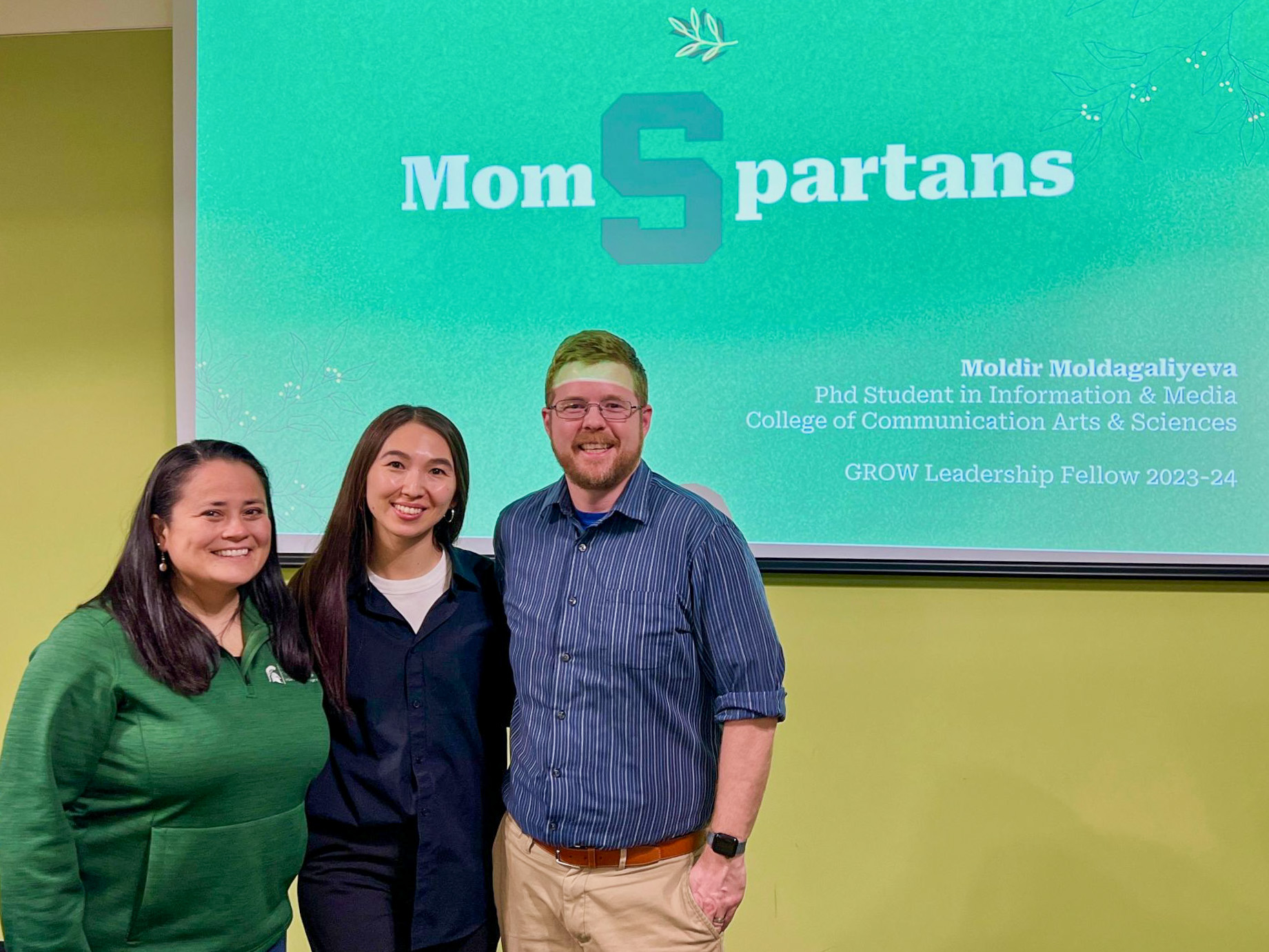The Graduate School is fortunate to have passionate graduate students who are committed to building a stronger, more connected graduate student community at Michigan State University.
The Leadership Fellows Program supports some of them in a year-long, cohort-based program housed in the Graduate School Office of Well-Being (GROW). It was designed to provide space for graduate and professional student leaders to engage in change-oriented projects, increasing graduate student well-being, inclusion, and ultimately success.
For Mother’s Day 2025, we are featuring second-year Leadership Fellow Moldir Moldagaliyeva, who is a doctoral student in Information & Media. In her writeup, Moldir talks about her experience as an international graduate student mom, which inspired her to develop MOMSpartans as a peer mentorship and support program.
What does it mean to be an international graduate student mom? 
Being an international graduate student mother means navigating three worlds at once—academia, parenthood, and adapting to a new country and culture—while being far from your home support system, parents, and friends.
It is about constantly balancing Zoom meetings and bedtime routines, managing your deadlines while helping with your children’s homework and extracurriculars. It is about building a home away from home—creating a safe, warm space for your kids while quietly dealing with your own homesickness.
It also means helping your entire family transition smoothly, often stepping into the role of a “cultural broker.” We serve as linguistic and cultural bridges, helping our family members navigate new systems they don’t yet understand. This invisible labor is exhausting at times, but it is also very important.
At the same time, the experience is rewarding. You learn to advocate for yourself and your children. You become more resilient and resourceful—and your family grows stronger alongside you. In my opinion, many of us (student mothers) are doing more than simply pursuing degrees. We show our children what courage, ambition, and perseverance look like in real life.
Any unexpected challenges you experienced?
We moved to the U.S. in 2020, right in the middle of the pandemic, for me to start my master’s degree. I was supposed to study in a hybrid format, but with all the disruptions, everything moved online. That first year was incredibly tough. I had just begun my academic journey in a new country, and at the same time, my eldest son—who was six—started first grade here in the U.S., knowing only a few basic English words. He couldn’t even form a sentence, and his classes were online, too.
Can you just imagine us—both of us sitting in front of screens, trying to figure things out? And then there were our other two children, who were 3.5 and 1.5 years old at the time, always at home since they weren’t in daycare yet. It was a full house, full of noise, chaos, and love—but also a lot of exhaustion. I honestly don’t know how we managed. Sometimes, when my husband and I talk about it now, we just shake our heads and laugh, like, “did we really survive that?”. It was truly a team effort.
Thankfully, by my second semester, things began to shift. Our eldest son started speaking English, and his school reopened for in-person learning. We finally got daycare spots for our younger two—thanks to MSU’s Spartan Kids Grant, which was a lifesaver—and life began to find a new rhythm.
There is another moment that really stays with me. My youngest was only 18 months old when we arrived, and I was still breastfeeding him. I remember staying up late to study, and he would cry in the middle of the night, asking to be breastfed. I would pause my readings or writing, nurse him, and sometimes fall asleep sitting up.
Then, I would wake up at random hours and keep studying. My sleep was broken, and my brain felt foggy half the time—but somehow, we made it through. I even remember the exact night in late October when we said, “okay, it’s time to stop breastfeeding.” It was a bittersweet milestone and a reminder that we were slowly moving forward.
How did you find balance between parenting and graduate school?
Balance, for me, has never been a fixed point—I am not even sure a perfect balance exists. Some days, I am more present with my kids; other days, I am racing to meet deadlines. My husband and I approach it all as a team—we coordinate schedules, divide responsibilities, and support each other, especially now that he is also a graduate student at MSU.
Now that the kids are a bit older—10, 8, and 6—they have started reminding us about balance. Sometimes they wake up in the middle of the night and find us still working at our laptops. And the next morning, they will say, “we think you should sleep more.” On weekends, they don’t wake us up early. Instead, they patiently give us a little extra time to rest. It is both touching and a little heartbreaking to see how aware they are.
I am still learning how to take better care of myself in the middle of it all, because beyond parenting and school, there is the essential layer of personal well-being. I love running—especially outdoors on campus—it helps clear my head and gives me space to breathe. I also try to cook healthy meals and create small routines that make our home feel warm. Because the truth is, parenting and academia can only thrive—and feel a bit balanced—if your own health and well-being are strong.
What is MOMSpartans and what made you decide to pursue this project? 
MOMSpartans is a peer mentorship and support project for international graduate student moms at MSU. The idea came from my own experience. When my family and I moved to the U.S., we were lucky to meet other student families from Kazakhstan who were already here. They kindly shared everything they knew — how to get daycare support, where to get physical checkups and immunizations, and what to expect from life at MSU. That support made such a difference for us. Since then, I have felt this urge to give back and help other student parents similarly.
I created MOMSpartans to be that point of support—especially for moms—because many international student mothers carry not just academic and parenting responsibilities, but also most of the housework chores and responsibilities. I wanted to create a space where they can ask questions, share resources, and just be heard.
Thus, I proposed the idea for the Graduate School Office of Well-Being Leadership Fellows Program and was selected to be a part of this amazing cohort-based program. While “MOMSpartans” started with moms in mind, it is a welcoming space for all student parents who want to help or participate.
What do you hope to achieve through it?
I hope to make the journey a bit easier for other international student moms, especially when they just arrive. Last school year, I interviewed 11 international student mothers from 9 different countries to better understand their challenges and needs.
Many of them were the only or one of a few student parents in their programs. They shared how much they wished they had someone to talk to who understood what it was like. That’s why this year, we piloted a peer mentorship program called MomPals, by pairing first-year international student moms with more experienced student mothers. The goal was simple: offer social support and encouragement. It has been so heartwarming to see how these relationships blossomed.
Another big challenge that came up in the interviews was the lack of information. MSU is a huge university with so many useful resources, but for a new international student with children, it can be overwhelming to know where to begin. So, with the help of current student parents who shared what they have used and found helpful, I pulled together a resource guide. It is not meant to be exhaustive, but rather a starting point and includes resources on childcare, healthcare, community spaces and more.
Looking ahead, I plan to bring MomPals mentorship back in Fall 2025—exactly when first-year student-parents need it most. How many moms we can support will depend on the support we receive. Therefore, I kindly ask MSU units and organizations to consider supporting this initiative—whether through meal tickets, funding, or other resources—so that MomPals pairs can meet over lunch or breakfast next fall semester. These informal meetups are more than just a meal—they create space for connection and friendship. I would also ask our Spartan community to share the guide with anyone who may benefit from it.
What is one piece of advice you would give another graduate student parent?
Don’t be shy to talk to others or ask questions. People around you might have the exact answers you are looking for—or they might point you to someone who can help. You don’t have to figure everything out on your own. You are not alone!
Also, make sure to join the Student Parents Resource Center (SPRC). It is a “home base” organization for student parents at MSU and offers so much support—from diapers to childcare grants. It is one of the most helpful resources I have found on campus.
Where can graduate student parents find more information or reach out?
If you want to learn more about the guidebook or mentorship program, feel free to reach out to me directly at moldagal@msu.edu. I will also be sharing updates about the mentorship program in Fall 2025 through the Student Parents email list managed by SPRC.


